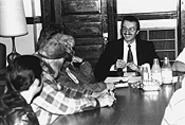The bar closed more than two years ago. But Dowhaniuk has kept the bag as hard evidence of the soft management he attributes to the bar's owner -- Cleveland City Councilman Nelson Cintron Jr. "I haven't had to add to the bag since his bar closed," Dowhaniuk says.
A more dramatic reminder of the bar's troubled past is a hole in Dowhaniuk's gutter, which he says was created by a bullet fired by a bar patron. It ricocheted through his yard and lodged in a neighbor's house.
Now a different sort of shooting war has broken out at the corner of Scranton and Starkweather Avenue in Tremont, as Cintron has announced his intention to open a "family-style restaurant" at the old bar site. No longer willing to let his liquor license sit idle, he plans to serve alcohol along with the food.
The news has many area residents upset. During a recent block club meeting that did not include Cintron, residents attacked his track record as a business operator.
"He couldn't control the place the first time. Why will he handle it this time?" yelled Dowhaniuk.
"Are we going to have a repeat of what we had when he was there before?" asked block club president John Popow, who promised to organize a meeting with Cintron to discuss the project.
According to Dowhaniuk and other residents, Cintron's bar -- Hoyas Sports Place -- had become a source of after-hours drinking and gambling, noise, public intoxication, and numerous parking problems. The ruckus ended when Cleveland police officers raided the bar in late January 1998, making several arrests for drug possession and underage drinking. In response, Cintron -- who owned the liquor license, but had let someone else manage the bar -- padlocked its doors.
"In the interest of the community, I am shutting it down," he told the news media. "I don't need this type of business in the area. I'll take the loss."
His posture is less conciliatory now.
"Before people start attacking me, they should wait for the plans," says Cintron, who earlier suggested that the shuttered bar be turned into a coffee shop or ward office. "I'm talking about an affordable place. It won't be overpriced, like other places in Tremont. My intention is to do a nice restaurant on the site."
Cintron's defensiveness is fueled, in part, by what he says is a long-standing bias against him created by the Tremont West Development Corporation, which helped organize the recent block club meeting. In 1997, Tremont West led an unsuccessful voter drive to "dry up" the precinct. If the drive, which was narrowly defeated, had been successful, Cintron would have been forced to close and move his liquor license out of the neighborhood.
"I'm not going to have people twist my arm," he says. "Tremont West tried to do it when I was running for council, but the community supported me. My fear is that [Tremont West] will try to gentrify this neighborhood. I won't let them gentrify this area."
Tremont West Executive Director Emily Lipovan says Cintron's bar was not the only target of the campaign. She cites the Lincoln Heights Tavern, located next to Cintron's bar, for contributing to many of the problems in the neighborhood. That bar closed after losing its liquor license.
"In 1997, I met with the residents of the area three times, and they said they were threatened by patrons of Lincoln Heights Tavern and [Cintron's bar] next to it," she says. "The residents tried to dry out the area once, and they will try again."
Tremont West would prefer to see less commercial development in that corner of the neighborhood, according to Lipovan, adding no more than light retail, like a second-hand clothing store.
But Cintron has already made a substantial financial investment in the proposed restaurant site and can't afford to be forced out of the neighborhood now. Last summer, for instance, he purchased the building that housed his sports bar. He had been leasing the space for $400 a month from his elderly relatives, Iris and Francesco Caraballo, who lived in one of the building's upstairs apartment units.
Initially, the Caraballos refused to sell to Cintron, whose lease gave him the option to buy the property for $40,000 at any time or be refunded his rent payments dating back to 1993. Iris Caraballo tried to terminate Cintron's lease, claiming he had missed payments in the past. But she was unable to prove it.
According to the Caraballos' attorney, Julian Kahan, the lease -- which gave Cintron the option to buy the property indefinitely -- left the Caraballos at a disadvantage. He says the elderly couple lacked proper legal representation at the time the lease was drawn up. And the only reason the Caraballos couldn't prove that Cintron missed rent payments, he says, is because they were "very poor bookkeepers."
With the courts on Cintron's side, the Caraballos eventually sold him the building. (The couple used the money to buy a home.) Not long after buying the bar, Cintron secured a $56,000 line of credit for renovations. Currently, Cintron's father and two other tenants live in the building, and the councilman says he is making minor improvements to the property. (According to City Hall records, no building violations exist on the property, and no building permits have been pulled for renovation work.)
If community opposition continues to build, Cintron could be in the uncomfortable position of waging a nasty public fight against city residents. But he's obviously weighed the political -- and financial -- costs of such a battle.
"If [Tremont West] has the money, I'm willing to sell the damn building," he declares. "No one will play politics with me and make me lose my money."


